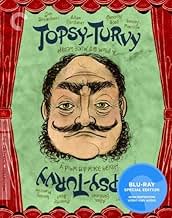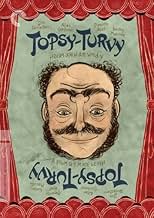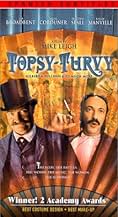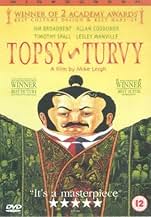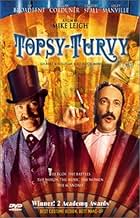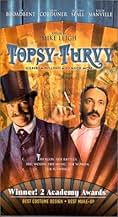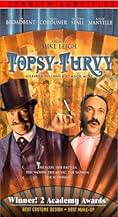Topsy-Turvy
- 1999
- Tous publics
- 2h 40min
NOTE IMDb
7,3/10
14 k
MA NOTE
Ajouter une intrigue dans votre langueSet in the 1880s, chronicles how during a creative dry spell, the partnership of the legendary musical/theatrical writers Gilbert and Sullivan almost dissolves, before they turn it all aroun... Tout lireSet in the 1880s, chronicles how during a creative dry spell, the partnership of the legendary musical/theatrical writers Gilbert and Sullivan almost dissolves, before they turn it all around and write the Mikado.Set in the 1880s, chronicles how during a creative dry spell, the partnership of the legendary musical/theatrical writers Gilbert and Sullivan almost dissolves, before they turn it all around and write the Mikado.
- Récompensé par 2 Oscars
- 13 victoires et 28 nominations au total
Bill Neenan
- Cook
- (as William Neenan)
Avis à la une
10ahab1013
Simply put, a brilliant film.
Topsy Turvy captures Gilbert and Sullivan in the midst of a turbulent period in their partnership. Desperate to be taken more seriously as a composer, Arthur Sullivan attempts to renege on the Gilbert and Sullivan contract with the Savoy Theatre. While his partner William S Gilbert struggles to come up with something new to write about. Each man, in a sense, is longing for individual acclaim but they are trapped in an entity neither one can shake. The fame of their collective energies has taken on a life of its own and the theater crowds want more.
The film is mostly the story of a theater production of the Mikado, one of Gilbert and Sullivan's most famous operas. Director Mike Leigh, notorious for writing on the go, has structured a play within a play to a great delight. Jim Broadbent and Allan Corduner are brilliant as Gilbert and Sullivan, and Tim Spall has a wonderful turn as one of the actors, Mr. Temple.
Their is more here than just two playwrights. The entire cast is seen as more than just pieces of a production. From choristers to administrative personnel, Topsy Turvy is alive with characters. One of the best is Gilbert's long-suffering wife Kitty. Bereft of children and saddled with a husband who doesn't show outward affection, Kitty (Lucy) could be a two dimensional afterthought. However, her pain at being childless is wonderfully played by Lesley Manville. It is clear they love each other but neither is capable of articulating that love, very odd for a man who writes for a living.
Filled with humor and grace, Topsy Turvy is one of the best films about acting and a beautiful embrace of all things theatrical.
Topsy Turvy captures Gilbert and Sullivan in the midst of a turbulent period in their partnership. Desperate to be taken more seriously as a composer, Arthur Sullivan attempts to renege on the Gilbert and Sullivan contract with the Savoy Theatre. While his partner William S Gilbert struggles to come up with something new to write about. Each man, in a sense, is longing for individual acclaim but they are trapped in an entity neither one can shake. The fame of their collective energies has taken on a life of its own and the theater crowds want more.
The film is mostly the story of a theater production of the Mikado, one of Gilbert and Sullivan's most famous operas. Director Mike Leigh, notorious for writing on the go, has structured a play within a play to a great delight. Jim Broadbent and Allan Corduner are brilliant as Gilbert and Sullivan, and Tim Spall has a wonderful turn as one of the actors, Mr. Temple.
Their is more here than just two playwrights. The entire cast is seen as more than just pieces of a production. From choristers to administrative personnel, Topsy Turvy is alive with characters. One of the best is Gilbert's long-suffering wife Kitty. Bereft of children and saddled with a husband who doesn't show outward affection, Kitty (Lucy) could be a two dimensional afterthought. However, her pain at being childless is wonderfully played by Lesley Manville. It is clear they love each other but neither is capable of articulating that love, very odd for a man who writes for a living.
Filled with humor and grace, Topsy Turvy is one of the best films about acting and a beautiful embrace of all things theatrical.
I am a violinist who has done a lot of theater shows and have seen lots of theater rehearsal.
For me this film has everything - the scenery is more lavish and beautiful than I've ever witnessed anywhere. For me, the interest _is_ the behind-the-scenes view of the actors. The fact that Allan Corduner (Sullivan) is actually a musician (not just miming the piano work) is a real plus. The scene of the recital of his "Lost Chord" was a marvelous musical moment. It captured the atmosphere of an old-style home recital, with earnest artists and elegant surroundings. And the rehearsal scene with the trio Grossmith (Koko), Barrington (Poo-bah), and Beauville each singing why they can't chop their own heads off is a marvelous view of what rehearsal can and should be like. Everyone has learned their words but now we're refining the artistry. The director assumes the viewer is well versed and doesn't beat him over the head. I feel honored that I am being treated as an intelligent watcher. When Gilbert says to Beauville, "I've gone to great length to give you triplets..... so let's do it again and let's ....'trip'", and they do, and it really works, I get the feeling that they live in and understand my world. Every moment of the film has for me a beauty.
The snippets of the other G&S operettas are astounding. The wake-up scene in The Sorcerer is probably only a minute long, but each word and glance is well chosen, and everyone is in perfect character. Like the cliché, "Every bride is beautiful.", every man and woman in this cast is beautiful.
Another remarkable moment in the film is Temple's "Mikado Song" when he dances, and the aftermath where Gilbert cuts the number and it then gets reinstated by the chorus men and women cornering Gilbert in the stairwell. My experience is that people in theater really do care for each other and they wish each other well. When someone does something of artistic merit, they know it, and want it to be displayed.
Almost every moment of this film rings true to me as a musician, and I treasure it. I can start this video at any random spot on the tape and find something to enjoy for 10 seconds or for another hour.
Because much of the film centers around Mikado, anyone who has ever worked on Mikado as an actor, crew, or musician will find much to enjoy. For someone who is not at all familiar with that operetta, I could understand them feeling that they can't see the continuity-- because the director has chosen not to repeat things. You will see this part and that part in preliminary stages of rehearsal but not again later, so if you saw the behind the scenes work, you won't see the 'finished product' except in the case of "Three Little Maids."
I was left wishing that this cast actually had created a full length version of Mikado, but alas I don't believe they did; all this work was for the sake of this film and it's not a documentary of an actual living repertory group.
For me this film has everything - the scenery is more lavish and beautiful than I've ever witnessed anywhere. For me, the interest _is_ the behind-the-scenes view of the actors. The fact that Allan Corduner (Sullivan) is actually a musician (not just miming the piano work) is a real plus. The scene of the recital of his "Lost Chord" was a marvelous musical moment. It captured the atmosphere of an old-style home recital, with earnest artists and elegant surroundings. And the rehearsal scene with the trio Grossmith (Koko), Barrington (Poo-bah), and Beauville each singing why they can't chop their own heads off is a marvelous view of what rehearsal can and should be like. Everyone has learned their words but now we're refining the artistry. The director assumes the viewer is well versed and doesn't beat him over the head. I feel honored that I am being treated as an intelligent watcher. When Gilbert says to Beauville, "I've gone to great length to give you triplets..... so let's do it again and let's ....'trip'", and they do, and it really works, I get the feeling that they live in and understand my world. Every moment of the film has for me a beauty.
The snippets of the other G&S operettas are astounding. The wake-up scene in The Sorcerer is probably only a minute long, but each word and glance is well chosen, and everyone is in perfect character. Like the cliché, "Every bride is beautiful.", every man and woman in this cast is beautiful.
Another remarkable moment in the film is Temple's "Mikado Song" when he dances, and the aftermath where Gilbert cuts the number and it then gets reinstated by the chorus men and women cornering Gilbert in the stairwell. My experience is that people in theater really do care for each other and they wish each other well. When someone does something of artistic merit, they know it, and want it to be displayed.
Almost every moment of this film rings true to me as a musician, and I treasure it. I can start this video at any random spot on the tape and find something to enjoy for 10 seconds or for another hour.
Because much of the film centers around Mikado, anyone who has ever worked on Mikado as an actor, crew, or musician will find much to enjoy. For someone who is not at all familiar with that operetta, I could understand them feeling that they can't see the continuity-- because the director has chosen not to repeat things. You will see this part and that part in preliminary stages of rehearsal but not again later, so if you saw the behind the scenes work, you won't see the 'finished product' except in the case of "Three Little Maids."
I was left wishing that this cast actually had created a full length version of Mikado, but alas I don't believe they did; all this work was for the sake of this film and it's not a documentary of an actual living repertory group.
Not being a big fan of opera (of the comedic variety or otherwise), I chose to watch this movie as a period piece, hoping to see a lot of eccentric characters putting on even more eccentric theatre. That was easy, since the trailer for the film points in that direction entirely.
What I didn't expect was a thoroughly entrancing inside view of the Victorian theatre. Not to mention comprehensive. Everyone is covered in this - from the stage boy through the chorus through the leads and producers and assistant directors. The telling of the complex relationships between the directors (Gilbert and Sullivan) and the leads is particularly poignant - whether dealing with the actors' considerable egos or their individual popularity among the chorus, nothing presented doesn't ring true.
I loved everything about this movie. It's a great story, told wonderfully by all involved. It is truly a film of much love and craft.
And I expect I'll be attending the next run of the Mikado next time it comes to town.
What I didn't expect was a thoroughly entrancing inside view of the Victorian theatre. Not to mention comprehensive. Everyone is covered in this - from the stage boy through the chorus through the leads and producers and assistant directors. The telling of the complex relationships between the directors (Gilbert and Sullivan) and the leads is particularly poignant - whether dealing with the actors' considerable egos or their individual popularity among the chorus, nothing presented doesn't ring true.
I loved everything about this movie. It's a great story, told wonderfully by all involved. It is truly a film of much love and craft.
And I expect I'll be attending the next run of the Mikado next time it comes to town.
Gilbert and Sullivan are a successful musical team writing their shows for the Savoy Hotel in London. However Sullivan is tired and is suffering from ill-health. During a bad bout he resolves to no longer write for the Savoy with Gilbert but instead to recover in France and then to strike out alone and write a grand opera. Gilbert meanwhile, is showing signs of fatigue coming up with plots that use the same devices to the same ends. However the two are contractually obliged to continue their relationship, a prospect both seem ill at ease with until Gilbert takes an afternoon off at an exhibition of Japanese culture, sowing the seeds of inspiration for The Mikado.
I honestly had never even heard of this film until the television premier in 2002, if you had told me Mike Leigh had made a film on such subject matter I would likely have laughed down my sleeve at such a suggestion. However I gave this a watch despite the fact I know little (or care little) for the works of Gilbert and Sullivan and worries bout the fact it was 160 odd minutes long! However the plot is sufficiently well delivered to take those who only know a little about the pair to keep up. By taking the snapshot of the Mikado to show their relationship the film takes away what could have been a rough, sprawling epic the snapshot works much better. The weaving of the production into the narrative, rather than all at the end, means that both sets of fans will be happy there is enough music to please those who came for that, but also enough plot within to drive the film.
Leigh does very well, mixing humour and telling drama with the music of the show. The production of the film (and the production!) are both very good and the detail is fine. The cast are all excellent. Broadbent is good as the straight-laced Gilbert and his chemistry with the enjoyable Corduner works throughout. The support cast are all good in singing and non-singing scenes I was surprised to see Spall carrying the tunes so well!
Overall this is a good film but I doubt that Gilbert & Sullivan will be much of a draw even now that it is on TV. However if you have the chance to watch it then you should push through your reservations and give it a try it is engaging and humourous enough to overcome a lack of knowledge (or interest) in the pair's work.
I honestly had never even heard of this film until the television premier in 2002, if you had told me Mike Leigh had made a film on such subject matter I would likely have laughed down my sleeve at such a suggestion. However I gave this a watch despite the fact I know little (or care little) for the works of Gilbert and Sullivan and worries bout the fact it was 160 odd minutes long! However the plot is sufficiently well delivered to take those who only know a little about the pair to keep up. By taking the snapshot of the Mikado to show their relationship the film takes away what could have been a rough, sprawling epic the snapshot works much better. The weaving of the production into the narrative, rather than all at the end, means that both sets of fans will be happy there is enough music to please those who came for that, but also enough plot within to drive the film.
Leigh does very well, mixing humour and telling drama with the music of the show. The production of the film (and the production!) are both very good and the detail is fine. The cast are all excellent. Broadbent is good as the straight-laced Gilbert and his chemistry with the enjoyable Corduner works throughout. The support cast are all good in singing and non-singing scenes I was surprised to see Spall carrying the tunes so well!
Overall this is a good film but I doubt that Gilbert & Sullivan will be much of a draw even now that it is on TV. However if you have the chance to watch it then you should push through your reservations and give it a try it is engaging and humourous enough to overcome a lack of knowledge (or interest) in the pair's work.
Mike Leigh's gloriously entertaining film, `Topsy-Turvy,' offers a wise and witty slice of musical theater history. Set in 1880's London, the movie chronicles the extraordinary personal and professional relationship between two giants of the 19th Century entertainment world, lyricist `Willie' Gilbert and composer Arthur Sullivan. The screenplay, wisely, chooses to pick up the tale not at the very beginning of their collaborative career - tracing its rise and fall as many biopics would do - but rather at the point where the team has already garnered international fame and success but seems of late to be experiencing a bit of creative stagnation. Sullivan, tiring of the seemingly trivial nature of the librettos they've been producing, wants to break away and embark on his own to produce a work of more `weighty' merit. Gilbert, on the other hand, delights in his success and, although bothered by comments in the press that his work has begun to repeat itself, initially resists Sullivan's plea that they abandon their hitherto winning formula.
Thus, the conflict between the two men of creative genius plays itself out against the fascinating backdrop of a deliciously recreated vision of the theatrical world of a hundred-odd years ago. Just as important to the film as the two main characters is the rich assortment of secondary players - theater proprietors, company actors, wives, lovers and parents - who swirl around the principals and provide a colorful tapestry to match the exquisite art direction and costuming that adorn the film. In addition, Leigh incorporates clever references to some of the technological marvels just making their appearance at the time: telephones, reservoir pens and luxury hotels with baths for every room!
Leigh's pacing is admirably unhurried and relaxed. So rich is the detail of his vision that fully thirty-five minutes elapse before the two lead characters even have their first scene together. In addition, the inspiration for `The Mikado' - ostensibly the centerpiece of the film's plot - doesn't strike Gilbert until well into the second hour. Yet, the film never falters in interest, least of all when Leigh devotes long stretches of footage to showing us the actors rehearsing their parts or having us eavesdrop on some behind-the-scenes salary negotiations or discussions of artistic differences. This is the real triumph of the film: Leigh opens up a world to us by letting us see the fascinating nuts-and-bolts aspects of the creative process to which we, as members of a theatre audience, are rarely privy. He also is not afraid to linger long over many a beautiful reproduction of the musical pieces themselves. Leigh can count his film a success in that it makes us want to rush out and catch a performance of one of these operettas ourselves.
The film would not be the splendid success it is were it not for the dazzling performances of its amazingly large cast. Jim Broadbent and Allan Corduner are perfection as the good-natured but often antagonistic partners, never playing the humor too broadly or violating the spirit of elite British gentility even in their most conflict-laden moments.
Indeed, it is this very quality of quiet subtlety that permeates every aspect of `Topsy-Turvy' and that makes it the wholly satisfying and entertaining film it is.
Thus, the conflict between the two men of creative genius plays itself out against the fascinating backdrop of a deliciously recreated vision of the theatrical world of a hundred-odd years ago. Just as important to the film as the two main characters is the rich assortment of secondary players - theater proprietors, company actors, wives, lovers and parents - who swirl around the principals and provide a colorful tapestry to match the exquisite art direction and costuming that adorn the film. In addition, Leigh incorporates clever references to some of the technological marvels just making their appearance at the time: telephones, reservoir pens and luxury hotels with baths for every room!
Leigh's pacing is admirably unhurried and relaxed. So rich is the detail of his vision that fully thirty-five minutes elapse before the two lead characters even have their first scene together. In addition, the inspiration for `The Mikado' - ostensibly the centerpiece of the film's plot - doesn't strike Gilbert until well into the second hour. Yet, the film never falters in interest, least of all when Leigh devotes long stretches of footage to showing us the actors rehearsing their parts or having us eavesdrop on some behind-the-scenes salary negotiations or discussions of artistic differences. This is the real triumph of the film: Leigh opens up a world to us by letting us see the fascinating nuts-and-bolts aspects of the creative process to which we, as members of a theatre audience, are rarely privy. He also is not afraid to linger long over many a beautiful reproduction of the musical pieces themselves. Leigh can count his film a success in that it makes us want to rush out and catch a performance of one of these operettas ourselves.
The film would not be the splendid success it is were it not for the dazzling performances of its amazingly large cast. Jim Broadbent and Allan Corduner are perfection as the good-natured but often antagonistic partners, never playing the humor too broadly or violating the spirit of elite British gentility even in their most conflict-laden moments.
Indeed, it is this very quality of quiet subtlety that permeates every aspect of `Topsy-Turvy' and that makes it the wholly satisfying and entertaining film it is.
Le saviez-vous
- AnecdotesNot only did all the actors do their own singing, but everyone in the cast, including the pit orchestra and the actors who play instruments in the film, actually played the music they are seen to play.
- GaffesThis well known quote from the film is a factual mistake: "If you wish to write a Grand Opera about a prostitute, dying of consumption in a garret, I suggest you contact Mr Ibsen in Oslo. I am sure he will be able to furnish you with something suitably dull". The city of Oslo got the name in 1925 - a long time after Ibsen's death in 1906. During Ibsen's lifetime, the capital of Norway was called Kristiania.
- Citations
Helen Lenoir: The more I see of men, the more I admire dogs.
- Crédits fousThe credit for "Location Vehicles" is misspelled "Location Vechicles".
- Bandes originalesIf You Give Me Your Attention
from "Princess Ida"
Music by Arthur Sullivan
Lyrics by W.S. Gilbert
Performed by Martin Savage and Chorus
Meilleurs choix
Connectez-vous pour évaluer et suivre la liste de favoris afin de recevoir des recommandations personnalisées
- How long is Topsy-Turvy?Alimenté par Alexa
Détails
- Date de sortie
- Pays d’origine
- Langues
- Aussi connu sous le nom de
- Mike Leigh Untitled
- Lieux de tournage
- Richmond Theatre, 1 Little Green, Richmond, Greater London, Angleterre, Royaume-Uni(Savoy Theatre, London, England, UK)
- Sociétés de production
- Voir plus de crédits d'entreprise sur IMDbPro
Box-office
- Budget
- 10 000 000 £GB (estimé)
- Montant brut aux États-Unis et au Canada
- 6 208 548 $US
- Week-end de sortie aux États-Unis et au Canada
- 31 387 $US
- 19 déc. 1999
- Montant brut mondial
- 7 804 439 $US
- Durée
- 2h 40min(160 min)
- Couleur
- Mixage
- Rapport de forme
- 1.66 : 1
Contribuer à cette page
Suggérer une modification ou ajouter du contenu manquant



